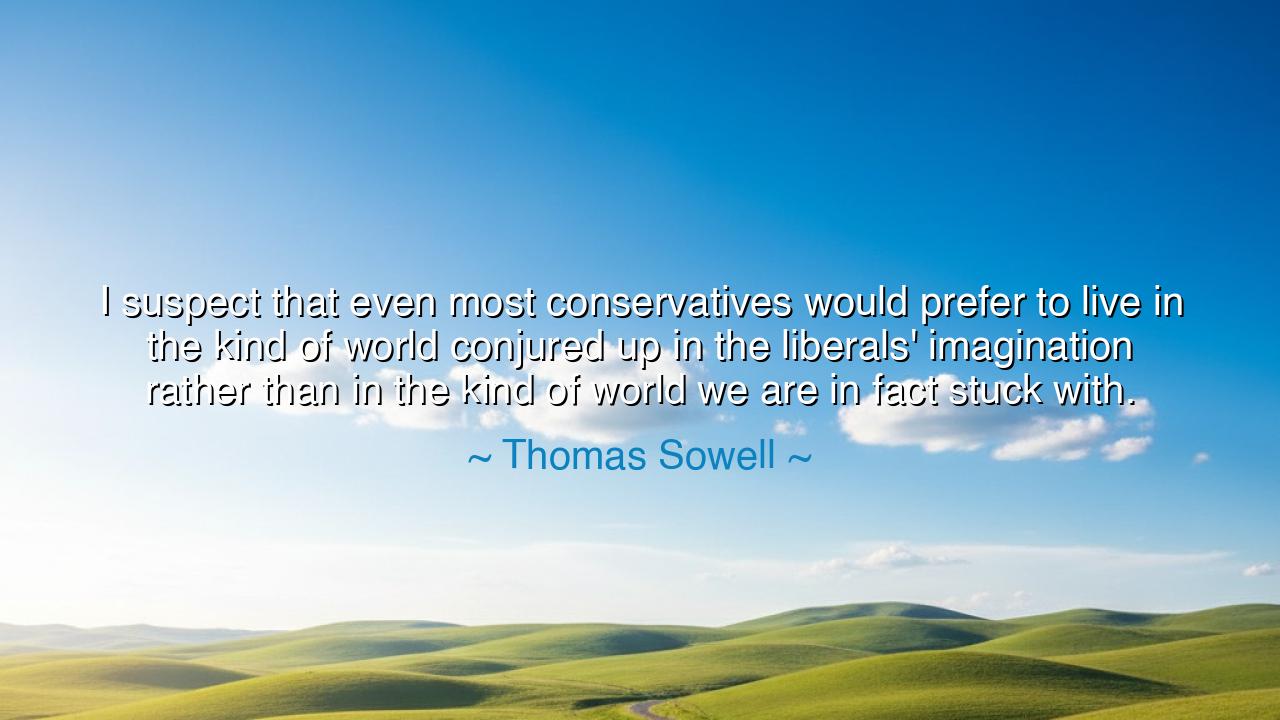
I suspect that even most conservatives would prefer to live in
I suspect that even most conservatives would prefer to live in the kind of world conjured up in the liberals' imagination rather than in the kind of world we are in fact stuck with.






When Thomas Sowell declared, “I suspect that even most conservatives would prefer to live in the kind of world conjured up in the liberals' imagination rather than in the kind of world we are in fact stuck with,” he spoke not as a partisan warrior, but as a philosopher of reality—a man who understood the eternal tension between idealism and realism, between the world as it is and the world as we wish it to be. His words are not an insult, but a reflection on human nature itself: that within every soul, regardless of belief or tribe, lies the yearning for a world of justice, peace, and abundance—a world that exists first in the imagination before it can ever be born in reality.
The origin of this quote arises from Sowell’s lifelong study of society, economics, and the patterns of human behavior. As a scholar, he often observed how competing visions—one utopian and one pragmatic—shape the destinies of nations. Yet here, in this rare moment of poetic insight, he acknowledges the power and beauty of the imaginative vision. He admits that even those who anchor themselves to cold reality cannot help but admire the dream of a better world. The heart longs for the heavens, even when the mind knows we walk upon the earth.
This truth is ancient. The philosopher Plato, in his Republic, imagined a perfect city ruled by wisdom and virtue. The centuries that followed saw kings and nations attempt to mirror that dream—and though none succeeded fully, the dream itself continued to inspire progress. Sowell’s reflection echoes this same eternal rhythm: that the imagination, though it may paint impossible visions, remains the mother of all reform. Without it, civilization would never advance; with it alone, untempered by reason, civilization would collapse into chaos. The balance between dream and discipline is the foundation of all human greatness.
Consider the story of Martin Luther King Jr., who stood before a nation divided by hatred and declared, “I have a dream.” His vision was not a description of the world as it was, but of what it ought to be. In that moment, he became both poet and prophet. Even those who opposed him, deep within their hearts, could not deny the beauty of the world he imagined—a world of harmony and dignity for all. It was through the imagination that he touched the conscience of a generation and moved the mountains of injustice. Sowell’s quote, though spoken from another vantage, acknowledges the same paradox: that the most practical of men still hunger for the worlds envisioned by dreamers.
And yet, Sowell also reminds us of the weight of reality. The world we inhabit is “the one we are in fact stuck with,” imperfect and stubbornly resistant to our ideals. It is a place where human frailty and the laws of consequence often crush even the noblest intentions. This is not cynicism—it is recognition. The wise understand that while dreams are wings, reality is gravity, and both are necessary if man is to fly without losing himself to the clouds. To live only in imagination is to court delusion; to live only in reality is to invite despair. True wisdom walks between them, dreaming boldly, yet building patiently.
Sowell’s insight thus speaks to both humility and hope. It teaches that while no vision of paradise will ever perfectly materialize on earth, each act of imaginative compassion—each dream pursued with reason—brings us closer to that shining horizon. Even the hard-headed realist can cherish the liberal imagination when it serves not to deny the world’s limits, but to transcend them through moral courage and human creativity. For all our divisions, all our differing philosophies, we share this same inheritance: the power to dream and the duty to act.
So, my listener, take this lesson to heart. Do not mock the dreamers, nor despise the realists. Both are necessary, as the day needs both sun and stone. Imagination without wisdom is folly, but wisdom without imagination is emptiness. Nurture both within yourself. When you dream, remember the ground beneath your feet; when you labor upon the earth, remember the sky above you. For it is in the meeting of the two—the dream of what could be and the truth of what is—that the world moves forward, one act of vision and courage at a time.
And thus, as Thomas Sowell reminds us, even those most anchored in the real world cannot help but yearn for the one imagined by the idealist. For imagination is not the property of politics—it is the birthright of the human soul. It is the lamp we carry through the darkness, illuminating not just what we see, but what we still might yet become.






AAdministratorAdministrator
Welcome, honored guests. Please leave a comment, we will respond soon